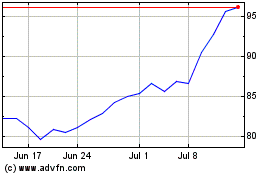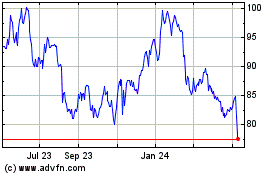Not even Steven Spielberg is immune to Chinese moves into
Hollywood.
Hollywood's highest-grossing director is teaming up with Jack
Ma's Alibaba Group Holding Ltd. in a partnership that will help Mr.
Spielberg's Amblin Partners produce, finance and distribute movies,
the companies said Sunday.
Amblin and the e-commerce company's movie business, Alibaba
Pictures Group Ltd., said their alliance will help Mr. Spielberg's
company distribute its movies in China, while Alibaba, in turn,
will rely on Amblin to become a bigger part of Hollywood's
production and distribution scene.
Alibaba Pictures will take a minority equity stake in Amblin and
gain a seat on its board. The companies didn't disclose financial
terms of the deal.
The partnership is the first in China for Amblin, formerly
DreamWorks Studios, which will also gain access to Alibaba's large
trove of data on Chinese consumers, an Alibaba spokeswoman
said.
To celebrate the alliance, Mr. Ma and Mr. Spielberg held a
conversation on a hotel-ballroom stage in Beijing on Sunday, during
which they said the two companies will promote values shared by
both the East and the West.
"We can do co-productions between our company and your company,
and we can bring more of China to America, and more of America to
China," Mr. Spielberg said.
Mr. Ma, executive chairman and founder of Alibaba Group, said:
"I don't see any human-value difference between West and East. The
only difference is the West can tell the story better than
Chinese."
The Amblin-Alibaba tie-up comes as China's already large
appetite for getting into blockbuster action—from movie producing
to cinema ownership—continues to grow, and Hollywood is eager for
greater access to the hard-to-navigate Chinese market.
Chinese box-office sales are No. 2 in the world, behind the
U.S., and Chinese investors have poured money into film ventures
from the U.S. to Europe.
Leading the way is Chinese conglomerate Dalian Wanda Group—owned
by Wang Jianlin, the only Chinese entrepreneur richer than Mr. Ma.
Wanda has purchased U.S. theater chain AMC Entertainment Holdings
Inc. and production company Legendary Entertainment, and is in the
process of buying Dick Clark Productions.
Alibaba Pictures has amped up its investments in the past year,
partially bankrolling "Star Trek Beyond," which pulled in more than
$20 million in its first week of Chinese release in September, and
"Mission: Impossible-Rogue Nation," starring Tom Cruise.
Distribution partnerships with Chinese firms have become
increasingly important for Hollywood studios, since they have
little control over how a movie is marketed or released in China.
Sony Corp.'s Sony Pictures Entertainment Inc. signed a deal with
Wanda last month to market Sony movies across Wanda's vast
holdings, and several Hollywood executives who have left studio
jobs have secured production deals backed by Chinese investors.
DreamWorks re-formed as Amblin Partners last year after
receiving more than $800 million in equity and debt and signing a
distribution deal with Comcast Corp.'s Universal Pictures. The fund
infusion—led by Participant Media, India's Reliance Entertainment,
Entertainment One and Mr. Spielberg himself—gave the struggling
company new life after years of box-office disappointments and low
output.
The first movie released under the Universal agreement, "The
Girl on the Train," opened at No. 1 at the box office this weekend.
Mr. Spielberg said at the time of the fundraising that he planned
to resurrect some of his beloved franchises and produce sequels to
the 2015 blockbuster "Jurassic World."
Any revival of Mr. Spielberg's previous blockbusters would open
in a global market that's increasingly reliant on Chinese
moviegoers. The Chinese box office is expected to be No. 1 in the
world in the next few years.
The Chinese market is also emerging as a place to make up for
lost ground if a movie fares poorly in the U.S. Summer releases
"Warcraft" and "Now You See Me 2" both had disappointing attendance
in North America, for example, but were hits in China, though
studios collect a smaller portion of box-office revenue from
Chinese cinemas. DreamWorks' own "Need for Speed" was one of the
first titles to alert Hollywood to this new lopsided trend when it
collected $66 million in China and $43 million in North America in
2014.
Mr. Spielberg's "The BFG," which opens in China on Friday, will
hope for a similar dynamic. The adaptation of the beloved Roald
Dahl children's book underperformed in North America, collecting a
paltry $55.4 million against a $140 million production budget. The
Walt Disney Co. release has collected an additional $120 million
from overseas markets so far.
At the end of Sunday's event, a promotional image for "The BFG"
was flashed on the ballroom's large screen.
Jeff Small, president and co-CEO of Amblin, said at the event
that, in mapping out its strategy for a larger China presence, his
company realized it wanted a partner that could serve as a guide
and which had a "deep bond with and knowledge of Chinese
people."
Alibaba Pictures has access to reams of information on Chinese
consumers. It runs an online ticketing platform, and its parent
runs China's biggest e-commerce platforms, with 500 million
users.
Net losses at Alibaba Pictures, which is publicly traded in Hong
Kong, have added up. The firm reported nearly 466 million yuan ($70
million) in net losses for the six months ended in June, up from
about 152 million yuan in the first half of 2015. It said an
increase in marketing expenses related to its online
movie-ticketing platform was a primary factor. Content-acquisition
costs and production spending also have kept the company from
turning a profit in the past.
One shared prospect for Alibaba Pictures and Amblin is the
developing field of virtual reality. Mr. Spielberg called virtual
reality "the latest and maybe the greatest" kind of format for
entertainment content in the future. Mr. Ma said mobile phones and
the Internet of Things will allow movies to be found in cinemas and
"all kinds of channels." He said: "My job is using technology to
support and empower these guys."
Write to Alyssa Abkowitz at alyssa.abkowitz@wsj.com and Erich
Schwartzel at erich.schwartzel@wsj.com
(END) Dow Jones Newswires
October 09, 2016 21:35 ET (01:35 GMT)
Copyright (c) 2016 Dow Jones & Company, Inc.
Sony (NYSE:SONY)
Historical Stock Chart
From Mar 2024 to Apr 2024

Sony (NYSE:SONY)
Historical Stock Chart
From Apr 2023 to Apr 2024
